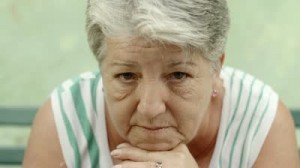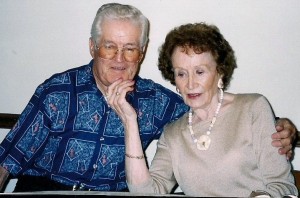Today’s post is Part 4 from Chapter 5, Helen’s story about her mother’s last days in my book, Final Years Stories of Parent Care, Loss and Lives Changed. Part 1 of my excerpt from Chapter 5, can be read at this link on my blog: Mom’s Final Act Hurts Those Left Behind. Part 2 can be read at this link: Mom’s Final Act Hurts Those Left Behind (Part 2), and Part 3 here: Nothing Was Ever Enough.
Mom Begins 24-Hour Care
 “One day—oh, this was when she almost died. I don’t know what happened. I think she was dehydrated, and she literally couldn’t get out of bed. Her neighbor had a key to her house and went and found her and called 911.
“One day—oh, this was when she almost died. I don’t know what happened. I think she was dehydrated, and she literally couldn’t get out of bed. Her neighbor had a key to her house and went and found her and called 911.
They came and started an IV and rushed her to the hospital. Her blood pressure was something like 60 over 30. She had a fever of 103. She was almost dead. She was septic. And I got a call that morning and jumped on a plane. I got there when she was still in the emergency room, and the doctor came out and said, ‘I’m not sure your mom is going to make it. She’s very, very sick.’ I was hysterical. I was afraid she was going to die in the ICU, which is so undignified with all those wires and tubes. You know all about that, being a nurse.”
I do.
“But I called all my siblings … At 6 p.m. she was in ICU, and I was sitting beside her bed. I said, ‘Mom, I have to leave and go to the airport and get my sister now.’ And she said, ‘I think I’d like some oatmeal.’ I said to myself, not to her, ‘my sister is going to be furious when I pick her up and tell her mom is asking for oatmeal,’—because we really thought she was going to die! It just struck me as really funny, at the time.
But she got better. That’s when we hired the 24-hour caretakers. Mom wanted to stay independent in her home. But after this hospitalization that followed a second type of chemotherapy where she lost her hair and got so sick, Mom said, ‘no more chemotherapy.’ That’s when she agreed to the plan my sister and I came up with for 24-hour care and hospice.”
“She had 24-hour care the last 3 months of her life, beginning after this episode when she was rushed to the ER and almost died. After that she agreed to stop chemo and hire live-in help. Once she went on hospice—she had to stop chemo in order to qualify for hospice care.
What was your experience like with your mother’s physicians and care providers?
“Mom had Kaiser health care. She could e-mail her doctor to communicate, but I couldn’t. I had to wait until I got back home to hear back from phone messages that I left with her doctors. Mom loved her gastroenterologist. He came to the hospital to see her, held her hand and said, ‘I’m sorry, there are no places left in you to put in any more stents.’ He was regretful and caring.”
Last Moments With Her Mom
 Can you go ahead and talk about what happened on the days leading up to her death, and your final visit? I know you all went out there before she died.
Can you go ahead and talk about what happened on the days leading up to her death, and your final visit? I know you all went out there before she died.
“One of my brothers was planning to be there over Christmas, so that she wouldn’t be alone. I think he got there the 20th or 21st. I’m not sure. But he called us all on the 23rd, and he said, ‘Mom’s not eating anymore.’
All along, even though she was losing weight and getting weaker, she had this great appetite. She was a foodie. She would tell us exactly what she wanted to eat for every meal. It killed her when she couldn’t be in the kitchen supervising us. It just killed her. And we were so relieved once she was not standing there telling us what to do! ‘Did you put salt in my oatmeal?’ She would say. Really …
So Mike called us on the 23rd, and said, ‘I think you all need to come. I think this is it.’ We just had had so many false alarms. But my sister and I flew out Christmas Day. I think it was a Sunday. She had stopped getting out of bed as well. Up until when my brother called us, she was getting up out of her bed and getting dressed every day. Not by herself—she needed assistance. And she refused to get back in her bed before 10 o’clock at night. She’d sleep on the couch. She hung out in her study. So it was just the last five or six days of her life where she quit getting out of bed. She didn’t have the strength. And she quit eating, so we figured he was probably right.
We all went. We had cousins in the area, and that day we made a nice dinner for Christmas. Mom didn’t want to come to sit at the table with us, but she did agree to get wheeled out in her wheelchair for some apple pie. I still remember, I brought her—I put a piece of apple pie in front of her and she looked at me, and said, ‘Where’s the ice cream?’
I said, ‘Seriously, Mom.’
I got the ice cream. And she ate about two bites of it and wanted to go right back to bed. She was not conversing with us. She was really not herself. She went back to bed. That was the 25th. My other brother, Jim, did not get there until the evening of the 26th, Monday. He’s the one who is just a year older than me. And she’d been sort of in and out of consciousness all day. I ended up having to flush her drain; she had a biliary drain, because the tumor was causing blockage, and it wasn’t draining well. The visiting nurse wanted us to go have it changed. We said, ‘she’s not strong enough to make a trip to the hospital. That’s insane.’ She said, ‘well then you’re going to have to flush it yourself because I can’t come out three times a day.’ So I had to flush her drain a couple times that day.”
Was it hard to play a nursing role?
“I didn’t mind that much. To the very end, she refused to use diapers. She would not do it. We had a little bedside commode. On the 26th, I have a vivid memory of helping her up to sit on this bedside commode. We also had paid help 24 hours a day. She had somebody taking care of her personal needs. So she and I got mom up on the commode, and she—she couldn’t even sit on it. She was falling off, and I was holding her up. It was just miserable. I remember the helper looked at me and said, ‘We are not getting her up again. This is ridiculous.’
I do not think she ever—we got diapers and put them on her, but I don’t think there was ever—I don’t think she ever went to the bathroom in a diaper. She just was too proud, you know.
Anyway, the evening of the 26th, my brother Jim showed up. We warned him on the way home from the airport, ‘she looks really bad.’
He walked in and tapped her, and he said, ‘mom, I’m here.’ She opened her eyes and reached up. She had the biggest smile on her face—I’ll never forget it—she was so happy to see him. It was very touching. That was maybe 8 or 9 p.m. on the 26th.
My mom didn’t have room for all of us. My sister and I would stay all day and then go sleep at my dad’s and come back first thing in the morning. That day had been pretty emotional. I just had a feeling it was going to be any minute. I had my iPhone and was playing some beautiful Andrea Bocelli for her. I put it on the pillow by her head real softly, and I put my cheek next to hers and I cried. I felt super sad, and at about 10 o’clock that night, my sister and I decided to go. My brothers were both there; we were all sitting around her bed. I said, ‘Mom, I’m going to go sleep. I’ll be back first thing in the morning.’
And her very last words to me … Continue reading






 More than 5 million Americans are living with Alzheimer’s today. According to the
More than 5 million Americans are living with Alzheimer’s today. According to the 